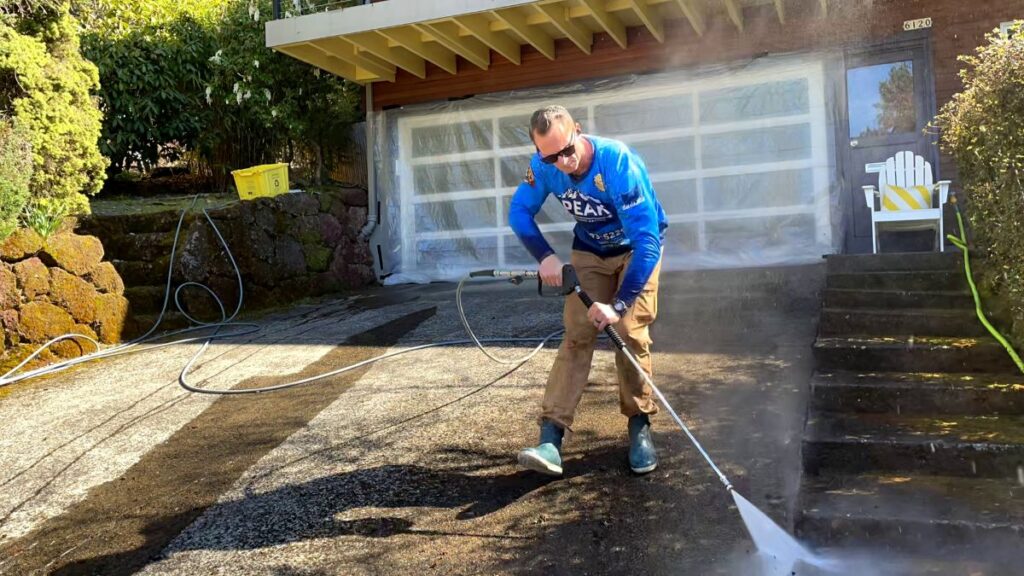Key Takeaways
- Paver sealing typically lasts 2 to 5 years, depending on various conditions.
- Environmental factors, foot traffic, and material type all impact sealant longevity.
- Visual and functional signs, like fading or water absorption, help determine resealing time.
- Choosing the right type of sealer is crucial to long-term performance.
- Professional sealing services help ensure even application and long-lasting protection.
Paver sealing is a vital part of protecting outdoor surfaces like driveways, patios, and walkways from wear, stains, and weather damage. In general, sealants can last anywhere from two to five years, depending on the type used and the conditions your pavers face.
For example:
- Heavy foot or vehicle traffic can wear down the coating faster.
- Harsh weather, including heavy rain or extreme temperatures, shortens lifespan.
- Porous materials absorb more moisture, increasing the need for resealing.
If your pavers are in a shaded, low-traffic area, you might get closer to the five-year mark. But in areas with high exposure and frequent use, a two- to three-year resealing cycle is often more realistic.
Signs It Might Be Time to Reseal
Waiting too long between reseals can lead to issues like staining, moss growth, or paver degradation. Here are signs that your surface may need attention:
- Faded color or dull appearance
- Loss of sheen or gloss (if previously sealed with a gloss finish)
- Water soaking in rather than beading off the surface
- Visible stains or mildew spots
- Weeds sprouting between joints
These symptoms usually mean the protective layer has worn off, leaving your surface vulnerable to weather and organic growth.
Types of Paver Sealants and Their Durability
Not all sealants are created equal. Here are three common types:
1. Penetrating Sealers
These soak into the surface and provide internal moisture resistance without changing the appearance. Best for:
- Natural stone or highly porous materials
- Homeowners who prefer a matte, natural look
Lifespan: 2–3 years
2. Film-Forming Sealers
These create a visible barrier and often leave a gloss or wet look. Ideal for:
- Enhancing color vibrancy
- Protecting against oil and chemical stains
Lifespan: 3–5 years (with proper prep and application)
3. Hybrid Sealers
These combine elements of both penetrating and film-forming sealers for balanced protection and aesthetics.
Lifespan: 3–4 years
Choosing the right product depends on the type of pavers, desired appearance, and exposure to traffic or elements. Professionals often help match sealant types to your specific surface conditions.
Seasonal Considerations for Resealing
Timing your reseal project is just as important as the materials you choose. The best seasons to reseal are spring and fall when:
- Temperatures are mild (ideally 50–80°F)
- Humidity is moderate
- There’s minimal rain in the forecast
Extreme heat can cause sealers to cure too quickly, while moisture can interfere with proper bonding. Planning around weather ensures the longest possible performance from your application.
Material-Specific Factors That Affect Sealing
Different materials absorb sealants differently. Here’s how that impacts durability:
- Concrete pavers are moderately porous and benefit from penetrating or hybrid sealers.
- Brick pavers can be more absorbent and may require resealing more frequently.
- Natural stone pavers, like travertine or slate, need specialized products for optimal bonding.
Proper prep and surface compatibility are key to getting the most out of your sealant, no matter the material.
Why Professional Paver Sealing Is Worth It
While DIY kits may seem tempting, improper application can lead to uneven coverage, early failure, and even surface damage. Professional services can help with:
- Deep cleaning before sealing (essential for proper adhesion)
- Product selection based on your environment and material
- Even application that prevents pooling or missed spots
- Joint sanding that prevents weed growth and shifting
Peak Pressure Washing offers experienced paver sealing and sanding services designed for Oregon’s weather patterns and surface types. Their process ensures your surface not only looks great but holds up for years to come.
Creating a Long-Term Paver Maintenance Plan
Regular resealing is just one piece of the puzzle. Consider pairing it with other upkeep habits:
- Annual inspections to check for early wear
- Spot cleaning of stains or spills
- Joint sanding as needed to stabilize paver positions
- Proper drainage to avoid water pooling on the surface
Taking a proactive approach prevents problems and keeps your outdoor areas in top shape.
FAQs
How often should I reseal my pavers?
Typically every 2–5 years, depending on traffic and weather exposure.
What happens if I skip resealing?
You may see increased staining, moss growth, weed intrusion, and overall surface deterioration.
Is there a specific time of year that’s best for resealing?
Yes—spring or fall, when the weather is mild and dry.
Can I reseal pavers myself?
It’s possible, but not always recommended. Professionals ensure proper cleaning, prep, and application for lasting results.
How long does the sealing process take?
Typically 1–3 days, including surface preparation and drying time.
Sealing your pavers isn’t just about aesthetics—it’s about long-term protection. Knowing when and how to reseal can save you money, extend the life of your hardscapes, and maintain your home’s curb appeal. Working with trusted professionals like Peak Pressure Washing ensures the job is done right the first time, maximizing your investment for years to come.

